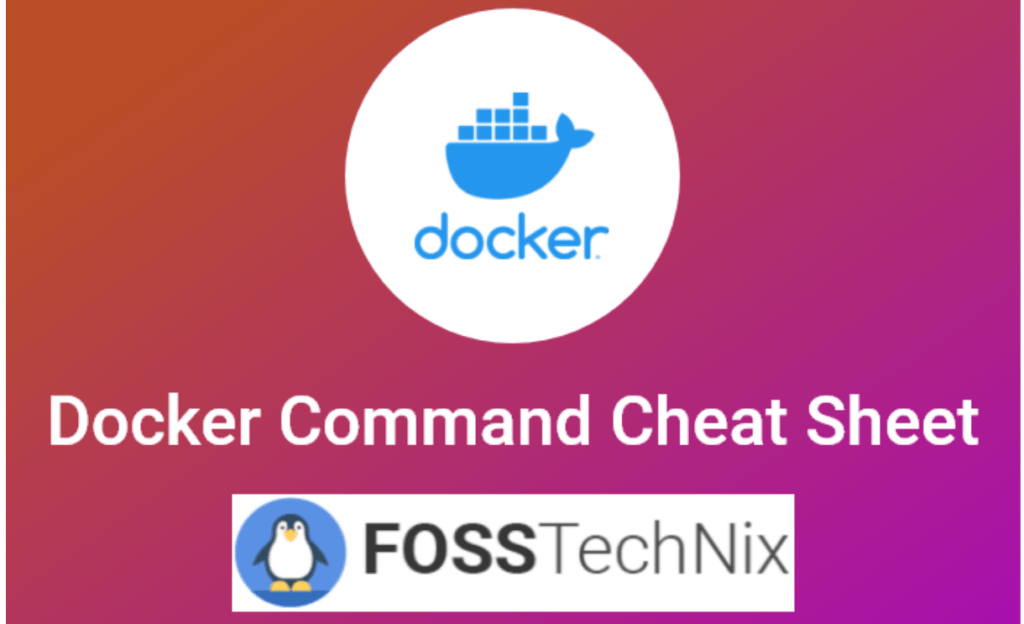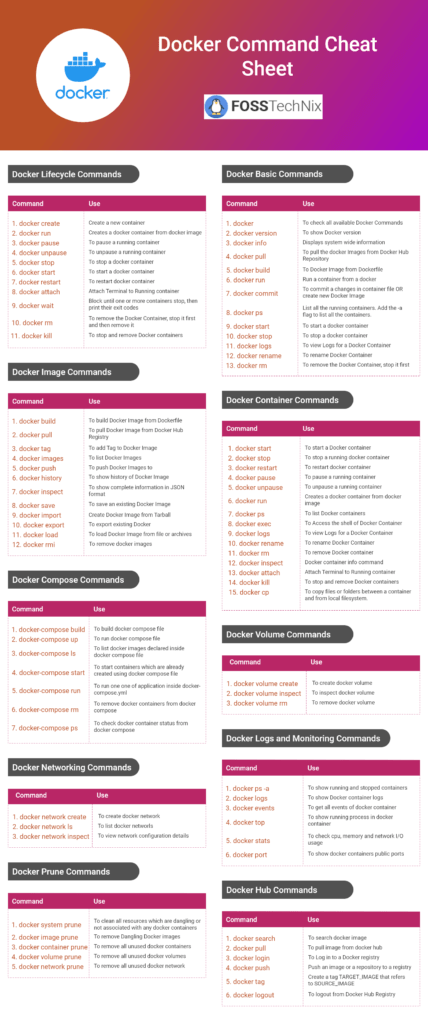In this article, We are going to cover Docker command cheat sheet in Image format , Docker compose commands cheat sheet and Docker commands cheat sheet pdf.
Table of Contents
Docker Command Cheat Sheet
Docker Lifecycle Commands
Below are some commonly used Docker Basic commands you will use frequently.
1) docker – To check all available Docker Commands
2) docker version – To show Docker version
3) docker info – Displays system wide information
4) docker pull – To pull the docker Images from Docker Hub Repository
5) docker build – To Docker Image from Dockerfile
6) docker run – Run a container from a docker image.
7) docker commit – To commit a changes in container file OR create new Docker Image
8) docker ps – List all the running containers. Add the -a flag to list all the containers.
9) docker start – To start a docker container
10) docker stop– To stop a docker container
11) docker logs -To view Logs for a Docker Container
12) docker rename – To rename Docker Container
13) docker rm – To remove the Docker Container, stop it first and then remove it
#1. Docker Image Commands
Docker Image is a application template including binaries and libraries needed to run a Docker container.
Below are some commonly used Docker Image commands while working with Docker.
1) docker build – To build Docker Image from Dockerfile
2. docker pull – To pull Docker Image from Docker Hub Registry
3. docker tag – To add Tag to Docker Image
4. docker images – To list Docker Images
5. docker push – To push Docker Images to repository
6. docker history – To show history of Docker Image
7. docker inspect– To show complete information in JSON format
8. docker save – To save an existing Docker Image
9. docker import – Create Docker Image from Tarball
10. docker export – To export existing Docker container
11. docker load– To load Docker Image from file or archives
12. docker rmi– To remove docker images
#2. Docker Container Commands
1) docker start – To start a Docker container
2) docker stop – To stop a running docker container
3) docker restart – To restart docker container
4) docker pause – To pause a running container
5) docker unpause – To unpause a running container
6) docker run – Creates a docker container from docker image
7) docker ps – To list Docker containers
8) docker exec – To Access the shell of Docker Container
9) docker logs – To view logs of Docker container
10) docker rename – To rename Docker container
11) docker rm – To remove Docker container
12) docker inspect – Docker container info command
12) docker attach – Attach Terminal to Running container
12) docker kill – To stop and remove Docker containers
13) docker cp – To copy files or folders between a container and from local filesystem.
#3. Docker Compose Commands
Docker compose is used to run multiple containers in a single application.
Below are some commonly used docker compose command line you should know
1) docker-compose build – To build docker compose file
2) docker-compose up – To run docker compose file
3) docker-compose ls – To list docker images declared inside docker compose file
4) docker-compose start – To start containers which are already created using docker compose file
5) docker-compose run – To run one one of application inside docker-compose.yml
6) docker-compose rm – To remove docker containers from docker compose
7) docker-compose ps – To check docker container status from docker compose
#4. Docker Volume Commands
1) docker volume create – To create docker volume
2) docker volume inspect – To inspect docker volume
3) docker volume rm – To remove docker volume
#5. Docker Networking Commands
1) docker network create – To create docker network
2) docker network ls – To list docker networks
3) docker network inspect – To view network configuration details
#6. Docker Logs and Monitoring Commands
1) docker ps -a – To show running and stopped containers
2) docker logs – To show Docker container logs
3) docker events – To get all events of docker container
4) docker top – To show running process in docker container
5) docker stats – To check cpu, memory and network I/O usage
6) docker port – To show docker containers public ports
#7. Docker Prune Commands
Using Docker prune we can delete unused or dangling containers, Images , volumes and networks
To clean all resources which are dangling or not associated with any docker containers
docker system pruneTo remove unused and stopped docker images
docker system prune -aTo remove Dangling Docker images
docker image prune
docker image prune -aTo remove all unused docker containers
docker container prune
To remove all unused docker volumes
docker volume prune
To remove all unused docker networks
docker network prune
We have covered Docker command cheat sheet.
#8. Docker Hub Commands
To search docker image
docker search ubuntu
To pull image from docker hub
docker pull ubuntu
Push the Docker Image again
docker push fosstechnix/nodejsdocker
To logout from Docker Hub Registry
docker logout
Download Docker Command Cheat Sheet in Image Format by clicking Download Button.
Download Docker Commands Cheat Sheet PDF format
Click on below to Download Button to download docker commands cheat sheet pdf format.
Conclusion
In this article, We have covered Docker command cheat sheet in Image format , Docker compose commands cheat sheet and Docker commands cheat sheet pdf.
Related Articles
Docker Installation
How to Install Docker on Ubuntu 19.10/18.04/16.04 LTS
How to Install Docker on Windows 10
Dockerfile Instructions
Dockerfile Instructions with Examples
Docker Image
How to Create Docker Image for Node JS Application [2 Steps]
Shell Script to Build Docker Image [2 Steps]
Docker Compose
How to Create Docker Image for Node JS Application [2 Steps]
Docker Commands
100 Docker Basic Commands with Examples


